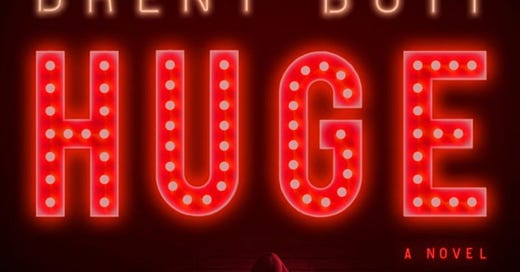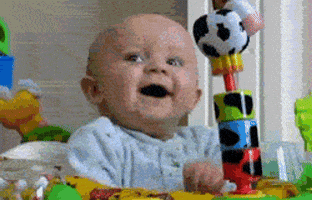Can you laugh and be scared at the same time?
Suspense with a side of standup: interview with Brent Butt, comedian and Canadian author of the bestseller, HUGE
Because Caitlin and I have always promised to be as nerdy as possible in this newsletter, I wrote the headline above and then, naturally, had to start googling science articles to answer the question even though science has nothing to do with this post…
…except for maybe two seconds.
YES, in fact, scientists say humor and fear are connected in interesting ways. But note that usually we get the fear first, then nervous or relieved laughter later, and this starts as early as the game “peek-a-boo,” played with babies, and continues with pranks, followed by all those horror movies you watched as a teenager, which made you scream then giggle uncontrollably.
Our collective anxious giggles and screams (definitely more screams) have not been so enjoyable lately—oops, no American politics, I promise!—but let me introduce you to an author who will help take your mind off all that for a little while.
A standup comic and International Emmy nominee, Brent Butt was the showrunner, writer, and actor on a treasured Canadian comedy TV series called Corner Gas, which ran for six seasons and was also made into a movie and animated series—only one of Butt’s many TV and film projects.
Last year, he debuted as a novelist with Huge, a psychological thriller set on the standup comedy circuit, available in a new mass market paperback edition.
I loved Huge. Of all the suspense novels I read each year, most of them start to blend together soon after I finish them. It can’t be helped! Suburban settings, duplicitous husbands, villainous neighbors, disappearing kids, long-hidden secrets from high school or college—hey, I use these tropes, too. No judgment. But the stories can run together.
Huge is different.
The setting is 1994 small-town Canada. Three comedians embark on a tour. One of them is Dale, a fortysomething ready to quit the business. The next is Rynn, a young, fast-rising star from Dublin, who provides the book with some of its best lines. And the third is Hobie Huge. An enormous, disastrously unfunny guy. Who happens to be a psychopath.
ANDROMEDA: You’ve told other interviewers that you were incubating this dark psychological thriller for years. During that time, what was your process? Did you make notes while you worked as a comic or did you let it sit in your subconscious until you’d finished touring and acting?
BRENT BUTT: Writing a book was on my bucket list for years. I always knew I was going to at least attempt to write a novel. I had no idea if I would be any good at it, or if I would even enjoy the process, but I knew I was going to attempt it. When I was very young, I made a list of things I wanted to write professionally when I grew up, and I’ve been fortunate enough to do almost everything on that list. Novel was the most daunting, so it sat for a long time. Then when the pandemic hit and we couldn’t go anywhere or do anything, I knew I was out of excuses. So I sat down to tackle a story that had been slowly forming for many years.
As a comedian, especially early in your career, you are sometimes obligated to go on the road with other comics you don’t know. Ninety-nine percent of the time it’s great. Every now and then though… you get paired up with someone who is very sketchy, clearly unstable, and possibly dangerous. Yet, you’re also in a situation where you’re sort of dependent upon this person as your travel/work companion.
It’s a very strange and unnerving scenario, and I always thought “this kind of discomfort could make for a good story one day”. I think it stewed in my subconscious for many years. While I was writing half-hour comedy scripts and a couple of funny feature films, this dark, very unfunny idea was ruminating, waiting for the day it could be put on paper. But there were precious few details in that stew. Just general thoughts. So when the time came, I had to sit down and do some actual plotting. But I plot in broad strokes and then start writing. Everything comes from character, for me. The characters really dictate what happens and why.
ANDROMEDA: In standup comedy, you get feedback immediately. And the feedback is clear! How did the writing and revision process feel by comparison? Was it hard to know what was working and what wasn’t? Did you need to learn any new skills in terms of trusting your own gut or knowing how to assimilate and implement delayed or conflicting feedback?
BRENT BUTT: Well, I started from a place of “who knows what this is going to be, if it’s going to be anything” so I just plowed ahead, damn the consequence. I revised a bit as I went – really playing with words and sentences to find what I liked. The first draft came fairly quickly, by novel standards – three months. I was pretty happy with it, but knew it needed work. So I mucked around with it for another four or five months, probably, until I had something I thought was decent. Then I asked some friends and associates I know, who are writers, to be beta readers and give me feedback. That led to more revisions. Then I got a literary agent and that led to a few more tweaks. But working in television for many years made me comfortable with the notes process, so it was not unchartered territory. Same notion, different genre. And yes, relying on your gut is a big part of it. Especially when it comes to balancing what others think versus what you think. When to comply, when to resist.
ANDROMEDA: I imagine that dialogue—and your dialogue is wonderful—comes easily, given your TV/film/comedy work. But you also excel at interiority and a type of description that is both granular and unexpected. For example:
They turned and saw a middle-aged man strolling their way. Both Dale’s and Hobie’s eyes dropped involuntarily to the man’s middle, where a prominent belly jutted from an otherwise average frame. The fellow behind the belly appeared to be an afterthought, like something hauled along out of obligation. Dale and Hobie looked up to the adjacent face. It was plenty round itself, although much less impressive. A pale, pocked-face moon trapped in orbit. The main crater opened and spoke.
Did you hone your description chops or do you have other thoughts about how you made sure this book reads like a novel (interiority, setting) rather than a screenplay? Any parts that were specifically delightful or onerous?
BRENT BUTT: First off, thanks very much. I just really enjoy our language. It’s part playground, part craftroom. In comedy you always want to find an unusual or original way to phrase things so they land a certain way and subvert expectations. Horror has a similar goal. I think I’ve always been honing descriptive chops, and then the novel just gave me extra room to run. To work it more than I ever had before. I read a great deal, also, especially dark thrillers – that’s my go-to material for fun – so I at least had a solid sense of the genre going in. Then you just want to put your own personal stink on it. Hopefully that’s what I did.
ANDROMEDA: I loved Rynn, your Dublin character. I didn’t want to say goodbye to her at the end of the book. Can you share any inspiration for this character and her voice, and/or any thoughts about a male author’s experience writing a convincing female character?
BRENT BUTT: The notion was to have three countries represented on the road trip. Originally it was a Canadian, an American, and a Brit. I’m not completely certain as to why I decided to change it from England to Ireland, if I’m being honest. I also knew I wanted one of the characters to be female, just to represent, so it wasn’t just dudes on the road. I’ve never really worried about writing women. I just write characters. I’ve written a great deal of dialogue for women on screen, and I never think about “how would a woman say this?” or “is this something a woman would say?” Never enters into my mind. I don’t think all women think or talk or act the same way any more than all men think or talk or act the same way. It all comes down to the individual, the character, for me. And Rynn, in my mind, was simply a sharp, fast wit who wasn’t easily intimidated. That is who she was, so I just wrote that.
ANDROMEDA: I read a lot of research on psychopaths and I enjoy novels that are psychologically convincing. (I appreciated that we get some of Hobie’s backstory, especially at the end of the book.) To create Hobie, did you rely on research, personal observation, or your imagination?
BRENT BUTT: Pretty much all imagination. Except when I looked up to see if there was an actual phobic name for “fear of being forgotten”.
ANDROMEDA: Huge was a bestseller in Canada. I’d love to hear about your experience going after an American or international audience, in comparison to a Canadian one.
BRENT BUTT: I couldn’t speak very much to that. My lit agent, Ron Eckel, and the team at Cooke McDermid did (and continue to do) all the international shopping. I’m woefully or perhaps blissfully unaware of that side of it.
ANDROMEDA: Funny. Scary. Those are two very different emotions. (Unless they’re not? You tell me!) You managed to evoke both throughout Huge. Any thoughts on how to write with a broad emotional palette? Any psychological suspense novels or movies that were models for you?
BRENT BUTT: I do believe that comedy and horror are sort of not-so-distant cousins. They both spring from a similar need to twist and subvert – they’re just hoping for different reactions. I absolutely do not believe that they must cancel each other out – or that a scary book can’t have some humour in it, or vice versa.
I think there’s been – especially over the last twenty years, or so – a tendency for people to say “that’s not something that can be joked about, it’s too serious or too scary” when often, those are exactly the subjects and the times when we need humour the most. The best first step in fighting a monster is to laugh at it. Takes away a bit of its power. Stephen King often has veins of humour drilling through his darkest stuff, and he does it incredibly well. Linwood Barclay can dance along that wire rather effortlessly, too. Belinda Bauer also writes some very dark stuff with funny lines in it. She’s kind of incredible.
ANDROMEDA: I am dying eager to know if you’re writing a second novel. Share if you’re willing.
BRENT BUTT: I am, in fact, working on my next novel. It is also a psychological thriller with some good, down-home, old-fashioned violence and terror. Beyond that, I won’t share too much.
ANDROMEDA: Great! Looking forward to it!
Brent Butt writes a Substack and you can find him on Instagram.






